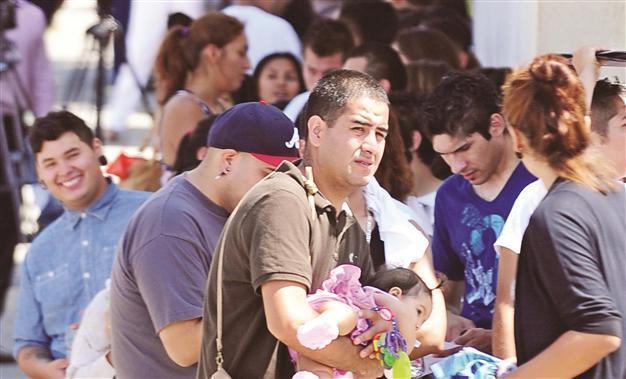Immigrants sign up for Obama’s new program
WASHINGTON

A man carrying a baby walks in front of a huge crowd lining up around the block from the office of the Coalition for Humane Immigrant Rights of Los Angeles. US authorities begin taking applications for deferred deportations from undocumented immigrants.
AFP photo
Hundreds of thousands of young illegal immigrants scrambled to get their papers in order Aug. 15 as the U.S. started accepting applications to allow them to avoid deportation and get a work permit for two years but not a path to citizenship.
President Barack Obama announced the program in June after pressure from Hispanic voters and others who said he hasn’t fulfilled a campaign promise to overhaul tangled U.S. immigration laws. Less than three months remain before what promises to be a tight election in which the growing Hispanic vote will play an important role. Some Republican lawmakers accuse Obama of boosting his political standing and of favoring illegal immigrants over unemployed U.S. citizens.
“While potentially millions of illegal immigrants will be permitted to compete with American workers for scarce jobs, there seems to be little if any mechanism in place for vetting fraudulent applications and documentation submitted by illegal immigrants,” The Associated Press quoted House Judiciary Committee Chairman Lamar Smith as saying. Homeland Security Secretary Janet Napolitano said the program is meant not as an amnesty but to establish a more efficient immigration policy.
The new plan is to stop deporting many illegal immigrants who were brought to the U.S. as children, and the Deferred Action for Childhood Arrivals could affect more than 1 million young illegal immigrants. But Alejandro Mayorkas, director of U.S. Citizenship and Immigration Services, said being approved to avoid deportation “does not provide lawful status or a path to citizenship.”
Age limit, no convictionTo be eligible, immigrants must prove they arrived in the United States before they turned 16, are 30 or younger, have been living in the country at least five years and are in school or have graduated or served in the military.
They cannot have been convicted of certain crimes or otherwise pose a safety threat. The Migration Policy Institute and the Pew Hispanic Center estimate that as many as 1.7 million people could be eligible to stay in the U.S. and legally work under the new policy. The federal policy change has been warmly received by Latino leaders, but has been derided by some Republicans as “backdoor amnesty.”
Arizona’s Republican governor, Jan Brewer, whose state has been at the center of the national immigration debate, issued an executive order denying public benefits in her state to immigrants who might qualify for temporary legal status under the relaxed federal rules.
Immigration advocates are not entirely satisfied either, calling the policy just a partial implementation of the Dream Act, a bill stalled in Congress that seeks to create a permanent legal status for the undocumented children of immigrants who entered the country illegally, Reuters reported. Department of Homeland Security officials have said they don’t have an estimate of how many people may apply.
In an internal document outlining the program’s implementation, officials estimated 1.04 million people would apply in the first year and about 890,000 would be eligible.
